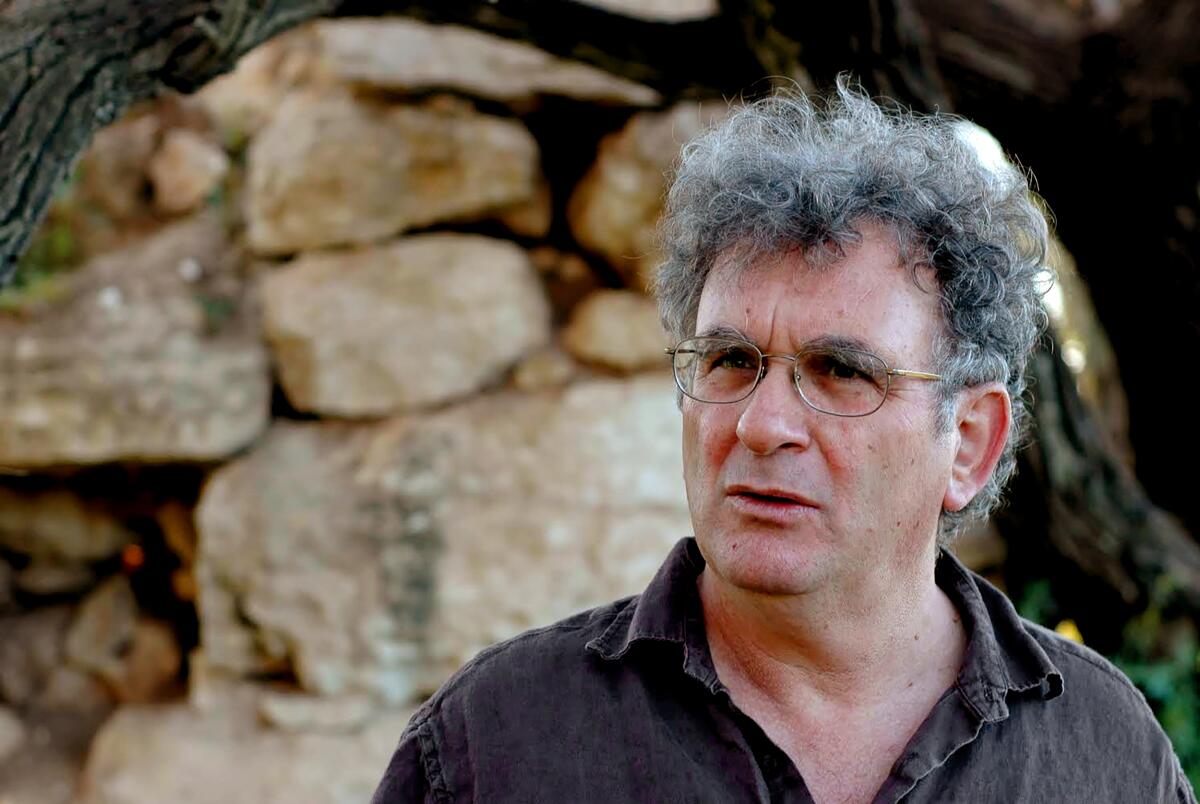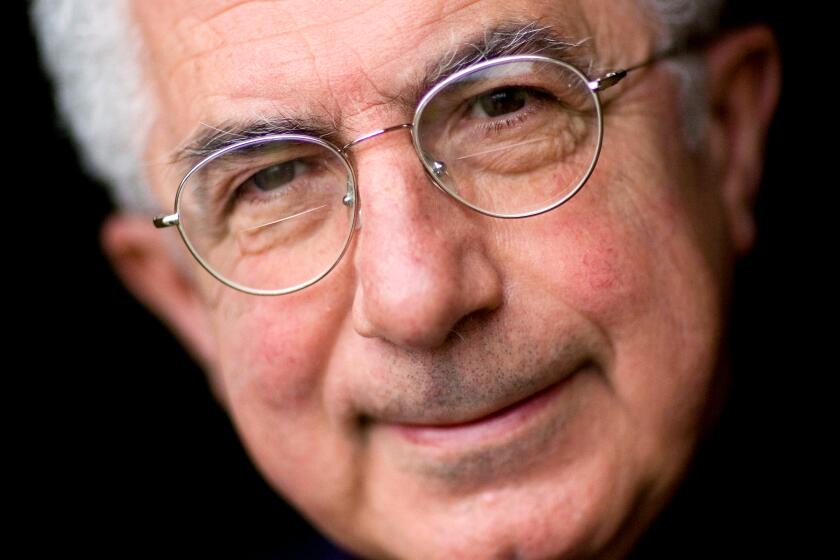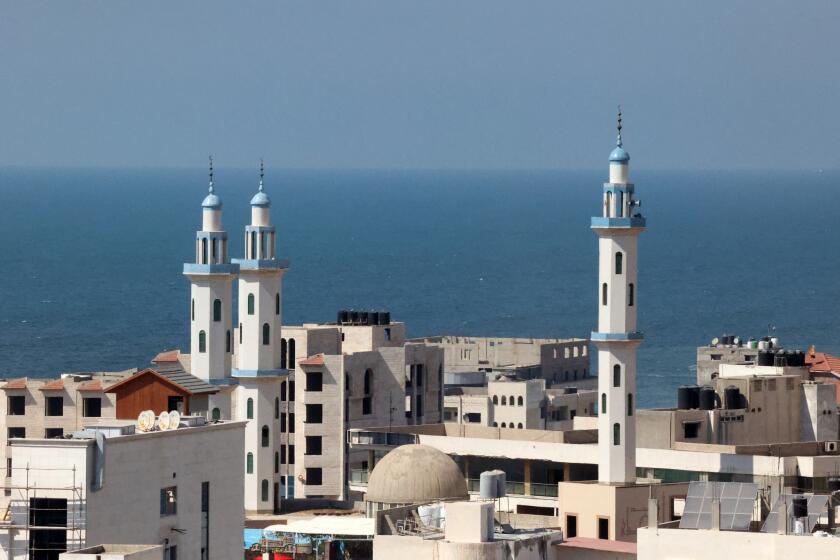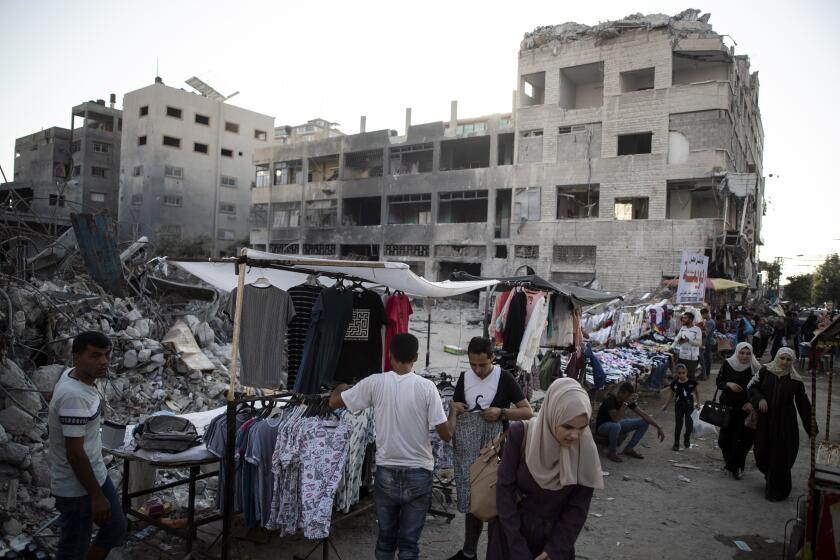The author of ‘1948’ on the ‘mistakes’ Palestinians made in Israel from the very start

- Share via
Arguing History
Author Benny Morris on the roots of the Israel-Hamas war
If you buy books linked on our site, The Times may earn a commission from Bookshop.org, whose fees support independent bookstores.
When Hamas invaded Israel on Oct. 7, the scale and savagery shocked the world. But the attack, as well as Israel’s ruthless response in Gaza, is less surprising in historical context: the intifadas of the 1980s and early 2000s, the 1967 war and ultimately the events surrounding Israel’s founding in 1948.
The Israel-Hamas war has created a vast divide — each side with its own set of arguments and sometimes impossible-to-prove facts. That isn’t just true of keyboard warriors or politicians; even historians within the same small movement can develop vastly different perspectives. If sorting out an objective truth feels hopeless, it’s still worth seeking points of convergence or, at the very least, stable terms of debate.
The Times is attempting to do that, beginning with two conversations with scholars once dubbed the “New Historians” — a loose group of Israeli revisionists who, in the 1980s, reexamined their country’s heroic origin story. As the interviews — one with Benny Morris, below, and the other with Avi Shlaim, which you’ll find here — make clear, there is no one answer to the same set of questions.
(The interviews were conducted before the start of a temporary cease-fire and hostage release.)
Even scholars from the same school of Israeli history disagree on the Israel-Hamas war. Here, Avi Shlaim argues why a two-state solution was never what Israel wanted.
Benny Morris — author of “The Birth of the Palestinian Refugee Problem, 1947—1949,” “1948: A History of the First Arab-Israeli War” and “One State, Two States” — was born in Israel, the son of liberal immigrants who raised him in Jerusalem. He fought in the 1967 War and was wounded while later serving near the Suez Canal. In the 1980s he refused to serve in the reserves against the first intifada because he disagreed with Israel’s policies.
Morris, 74, spoke by video from his home in Israel about the current war and how it is shaped by the past. This interview has been edited for length and clarity.

The history of this land is riven by two incompatible narratives, Israeli and Palestinian. What can we definitively say about what happened in 1948?
At the end of 1947, the United Nations proposed to divide the country into two states. In 1948 there were 1.3 million Arabs in Palestine and 650,000 Jews there. The Jews said yes, but the Arabs of Palestine said no and started shooting. It evolved into a full-scale Arab-Israeli war. Israel eventually won and 700,000 Arabs were uprooted from their homes, most ending up as refugees in the West Bank and in Gaza. [Some accounts put the number at 750,000.]
Both sides did awful things, which is what happens in wars. The Arabs were the losing side and my view is that if people commit major mistakes in history they pay for them and perhaps that’s how it should work out. The Palestinians should have agreed to a two-state solution.
Do Israelis and Palestinians see the current war in that context?
The Palestinians remember 1948 as a vast tragedy, the Nakba — their memory is filled with that but they’re not told or don’t care that they started the war. What they remember is that they’re refugees. I can certainly understand these descendants of refugees looking across the border and seeing these green fields and Israelis living in prosperity by comparison and feeling resentment and hatred.
The hatred essentially comes from the history of refugee-dom and Israeli occupation. But also when the Israeli government withdrew from the Gaza Strip in 2005 it ended up being administered by Hamas, this extremist, fanatical Islamist organization, which inculcates in its children hatred of Jews and Israel and the idea that everything must be solved by the sword. So the hatred also comes from an education system which brought up everybody believing that Jews must die and Israel must die. And one of the results of this is what happened on Oct. 7.
We asked leading writers from a range of backgrounds to recommend books to help understand the Israel-Hamas war. Here are 14 titles to start with.
Do Israelis also see this in the context of 1948?
The history is in the minds of everybody here in this region. But Jews also think, of course, of the Holocaust, which preceded 1948. When they engaged the Arabs in 1948, the Jews thought the Arabs were out there to commit a second Holocaust.
Benjamin Netanyahu recently talked about this as a second War of Independence, which some call code for Israel getting ready to commit a second Nakba and expel the Palestinians again.
That’s nonsense. It’s not code for anything. I’m not a supporter of Netanyahu — he’s a hateful, corrupt leader. But this thought about going back to 1948 really goes to the basics: the Zionist view is that the Arabs want to destroy the Jewish state. It’s not just the Gaza Strip, there’s constant shooting by the Lebanese Hezbollah and now the Houthis in Yemen are firing rockets into Israel and seized a[n Israel-linked] ship.
We’re surrounded by states and groups basically run by the Iranians, who are behind much of this. I’m not saying the Gaza Arabs don’t have their own native antagonism, but they’re also acting as agents, as the Hezbollah are, of Iran, which wants to destroy Israel.
The New Historians looked to break free from old ideas about the events of 1948. What misconceptions are there today?
In Israel, there’s a certain blindness — the television is constantly streaming what’s happening in Gaza and nobody says this actually does in some way derive from the tragedy of the Palestinians in ‘48 and onward. They don’t talk about ’48 or the occupation, which certainly reinforced anger and hatred of Jews. None of this explains the savagery of what happened, but it’s in the background and here it’s sort of ignored.
The Times’ newsletter head recommends six Palestinian memoirs, plus book awards by the numbers, Hollywood exposés and more in the Book Club Newsletter
You obviously have strong opinions. With this violent and tangled history and the current war, can any journalist or historian even be close to objective?
You’ll find very few Arab historians who are objective about their plight. They stick to their political narrative. Israelis can be a little more objective — many Israelis understand that the Palestinians have a case in the sense that they’ve lived here for centuries and deserve a self-determination. The Jews are freer to express their views because they don’t live in a dictatorship. And Zionism so far has been successful while the Palestinian national struggle has been unsuccessful. So Palestinians feel that they can’t give ammunition to the enemy by speaking out against their own mistakes and crimes. There’s an asymmetry between the two sides.
How did Oct. 7 change Israel’s sense of its invincibility?
Israelis felt almost completely invulnerable and certainly not vulnerable to a small terrorist army. There was hubris, and contempt for Arabs in general, and this led people to misread the signs. The army was caught totally with its pants down. This caused a tremendous sense of shock.
When you have women raped and civilians taken hostage, it hardens Israeli hearts towards Palestinians. But it might also reopen the whole Palestinian question. For decades Israel basically said, “We can live with this small amount of terrorism and occasional shooting matches,” but now the Palestinian problem is back on the international agenda and that’s certainly a result of this attack by Hamas.
A forensic investigator in Tel Aviv works to reassemble remains of victims of Hamas militants, trying to understand the causes of death and the underlying cruelty.
Then is there a possible solution?
Unfortunately, I’m a pessimist. A one-state solution with Jews and Arabs living nicely together running the place jointly is total nonsense. The two-state solution is what I favor and I think many Israelis and people in Western governments favored. My fear is that Palestinians still don’t want a two-state solution and believe Palestine is theirs and that the Jews came here illegally. And the right has basically taken over in Israel since 1977, and they also reject the two-state solution, feeling all of Palestine should be for the Jews, that the Arabs are interlopers and are all terrorists.
Many Jews would accept it, but they don’t control the government; we have an extreme right-wing government. So there’ll be more of the same. Israel, I hope, will destroy Hamas, but that doesn’t mean that that’s the end of the story. There’s 2 million Arabs living in poverty and misery in the Gaza Strip, and eventually the resistance or terrorism will rear up again.
More to Read
Sign up for our Book Club newsletter
Get the latest news, events and more from the Los Angeles Times Book Club, and help us get L.A. reading and talking.
You may occasionally receive promotional content from the Los Angeles Times.












